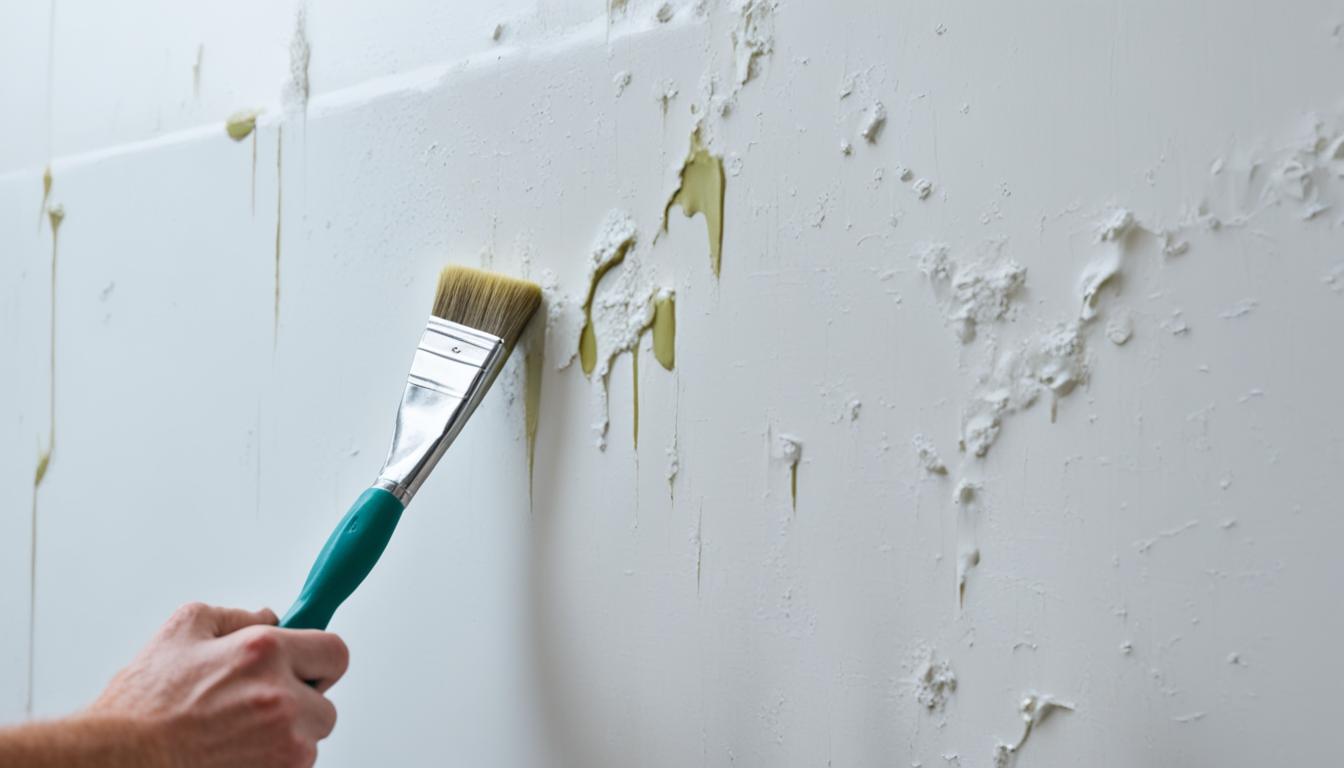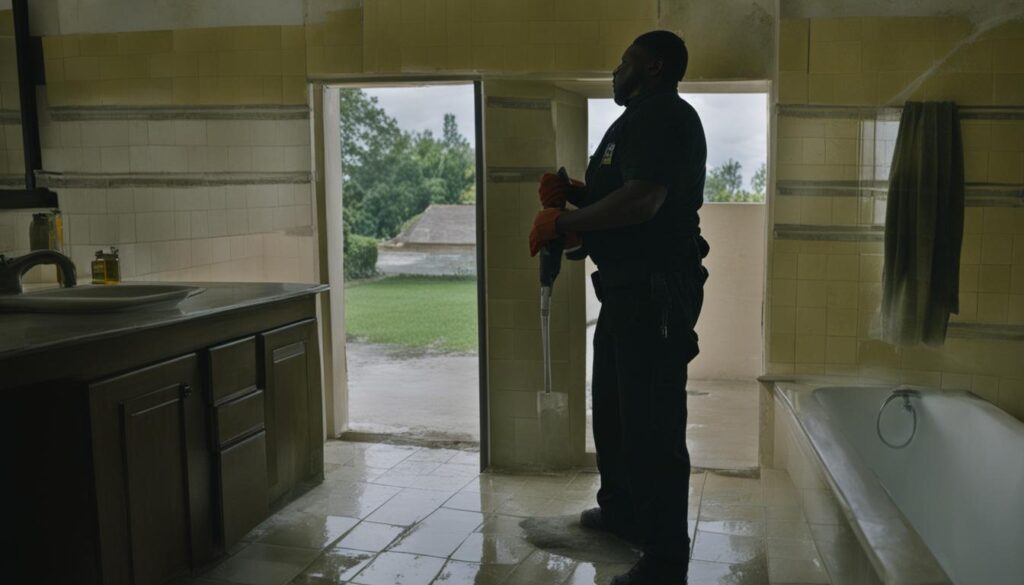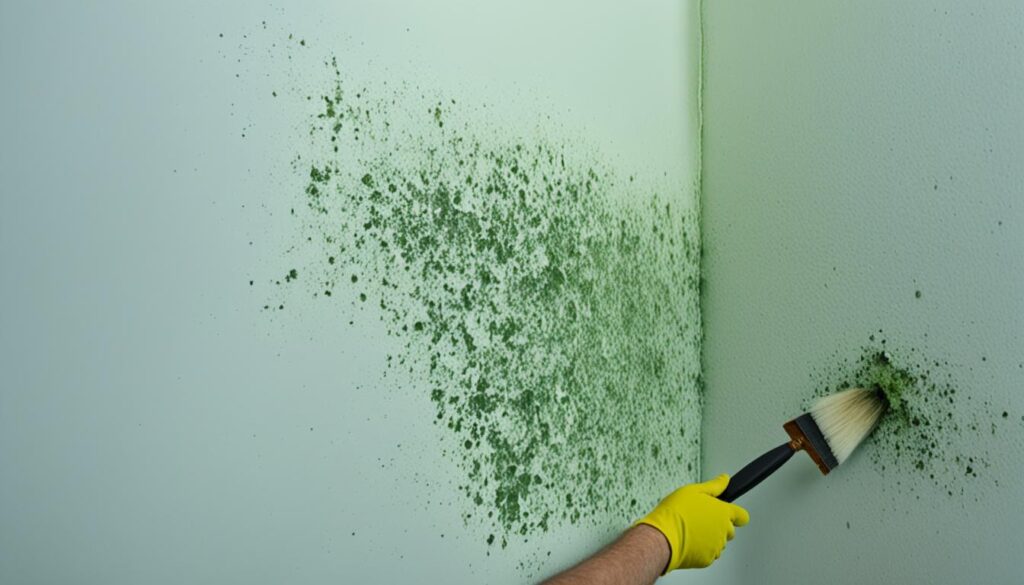
Landlord Paints Over Mold in Bathroom? Take Action!
Discovering mold in your bathroom can be a cause for concern, but what happens when your landlord simply paints over it instead of properly addressing the issue? This article will shed light on the alarming practice of landlords painting over mold in bathroom walls and the potential health risks it poses. We’ll explore the importance of taking action as a tenant and understanding your rights when it comes to mold remediation.
Key Takeaways:
- Landlords painting over mold in bathroom walls can pose serious health risks.
- Tenants have legal rights to a safe living environment and proper mold remediation.
- Report mold issues promptly to your landlord or relevant authorities.
- Proper assessment and remediation by professionals like Fix Mold Miami are crucial.
- Prioritize your health and safety by taking action against mold growth in your rental property.
Understanding the Health Risks of Hidden Mold
Hidden mold can pose significant health risks to individuals living in affected environments. While mold growth is commonly associated with damp and visible areas, such as bathrooms and basements, it can also thrive behind walls, under flooring, and in other concealed spaces. This section will explore the health risks associated with hidden mold and highlight the importance of addressing mold growth properly.
The Risks of Hidden Mold
When mold is hidden from view, it can continue to grow and release spores into the air. These microscopic spores can trigger various health issues, particularly among individuals with sensitivities or pre-existing respiratory conditions. Common health risks associated with hidden mold include:
- Respiratory Issues: Exposure to mold spores can irritate the respiratory system, leading to symptoms such as coughing, wheezing, and shortness of breath. Individuals with asthma or allergies may experience more severe reactions.
- Allergic Reactions: Mold spores can trigger allergic reactions in susceptible individuals, causing symptoms such as sneezing, itching, and watery eyes.
- Compromised Immune System: People with weakened immune systems, such as those undergoing chemotherapy or with HIV/AIDS, may be more susceptible to mold-related infections.
- Toxic Effects: Certain types of mold, such as black mold (Stachybotrys chartarum), can produce mycotoxins that can have toxic effects on the body when inhaled or ingested.
It is important to note that the extent of health risks depends on various factors, including the type and concentration of mold, individual sensitivity, duration of exposure, and overall health condition.
Properly Addressing Hidden Mold
When hidden mold is suspected or discovered, it is crucial to take immediate action to mitigate health risks and prevent further growth. Effective mold remediation involves identifying the source of moisture, removing the mold growth, and addressing the underlying cause to prevent recurrence.
Hidden mold growth can be challenging to detect without professional assistance. It is recommended to consult a qualified mold inspector or remediation specialist to accurately assess and address the extent of the problem.
Additionally, ensuring proper ventilation, reducing humidity levels, and promptly addressing water leaks or dampness can help prevent hidden mold growth in the first place.
By understanding the health risks associated with hidden mold and taking appropriate measures to address it, individuals can safeguard their well-being and maintain a healthy indoor environment.
Renter’s Rights and Mold Remediation
When it comes to mold remediation, tenants have rights that protect their health and ensure a safe living environment. Landlords have legal obligations to address mold issues promptly and effectively. To navigate this process and ensure proper mold remediation, tenants can take certain steps.
- Know your rights: Familiarize yourself with local renter’s rights laws and regulations regarding mold remediation. These laws vary from state to state, but they generally require landlords to maintain a habitable living environment free from mold and other health hazards.
- Document the issue: Take pictures or videos of the mold growth and any related damages. Keep records of any conversations or communications with the landlord regarding the issue.
- Notify the landlord: Inform your landlord or property management company about the mold problem in writing. Be sure to include details about the location and extent of the mold growth. This written notification will serve as evidence of your efforts to resolve the issue.
- Request mold remediation: In your written notification, request that the landlord schedule professional mold remediation. Be specific about the desired course of action, such as hiring a licensed mold remediation company, and include a reasonable timeframe for the remediation to be completed.
- Seek legal advice: If the landlord fails to address the mold issue or refuses to take appropriate action, consider seeking legal advice from a tenant rights attorney or contacting your local housing authority for further assistance.
Remember, mold growth can pose serious health risks, and it’s essential to prioritize your safety. By understanding your renter’s rights and taking proactive steps, you can ensure that mold remediation is carried out effectively and efficiently.

“Tenants have the right to live in a safe and healthy environment, free from mold and other hazards. If your landlord fails to address a mold problem, take action to protect your health and hold them accountable.”
Taking Action for Your Health and Safety
When faced with the health hazard of mold growth in your rental property, it is crucial to take action promptly to protect yourself and your loved ones. By following these practical steps and utilizing tenant resources, you can address the mold issue effectively.
1. Identify and Document the Mold
The first step is to identify the areas affected by mold growth. Inspect your property thoroughly, paying close attention to damp and poorly ventilated areas such as bathrooms, kitchens, and basements. Take clear photographs or videos as evidence of the mold’s presence. This documentation will strengthen your case when reporting the issue.
2. Report Mold Issues to Your Landlord
Contact your landlord immediately to report the mold problem. Provide them with the documented evidence and a written description of the issue. Be specific about the location and extent of the mold growth. Request prompt action to rectify the situation and ensure a healthy living environment. Keep a record of all communication with your landlord, including dates and details.
3. Familiarize Yourself with Renter’s Rights
It is essential to understand your rights as a tenant when it comes to mold remediation. Research your local laws and regulations regarding landlord responsibilities for maintaining a safe and habitable dwelling. This knowledge will empower you to advocate for your health and safety.
4. Engage with Tenant Resources
Many organizations and agencies offer valuable resources and guidance for tenants dealing with mold-related issues. Utilize these resources to educate yourself about your rights and responsibilities. Seek advice from tenant advocacy groups, public health departments, or legal aid services in your area.
“Taking immediate action and utilizing available tenant resources are crucial steps to mitigate the health hazards associated with mold growth in your rental property.” – Tenant Advocate
5. Consider Professional Mold Testing
If your landlord fails to address the mold issue adequately, you may want to consider professional mold testing. A certified mold inspector can assess the extent of the problem and provide an unbiased evaluation. This documentation can strengthen your case if legal action becomes necessary.
6. Document Health Symptoms
If you or your family members are experiencing health symptoms that may be related to mold exposure, it is essential to document them. Keep track of symptoms, their frequency, and their severity. This information can serve as evidence of the health hazards posed by mold growth.
7. Consult with Legal Professionals
If your landlord fails to address the mold issue or if your health is significantly impacted, consult with a legal professional specializing in tenant rights. They can provide guidance based on local laws and help you navigate through potential legal action.
By taking action promptly and utilizing tenant resources available to you, you can protect your health and safety when faced with mold growth in your rental property.

Fix Mold Miami – The Experts in Mold Assessments and Remediation
When it comes to dealing with mold issues, it is crucial to seek professional help for effective assessments and remediation. Fix Mold Miami is a trusted company that specializes in providing comprehensive services to address mold problems.
Why Choose Fix Mold Miami?
Fix Mold Miami stands out as a leader in the industry for several reasons:
- Expertise: With years of experience in the field, the team at Fix Mold Miami possesses extensive knowledge and expertise in mold assessments and remediation.
- State-of-the-Art Technology: Fix Mold Miami utilizes advanced equipment and techniques to accurately assess the extent of mold growth and effectively eliminate it.
- Thorough Assessments: Their experts conduct comprehensive mold assessments to identify the underlying causes and provide tailored solutions.
- Safe and Effective Remediation: Fix Mold Miami follows industry best practices to ensure safe and efficient mold remediation, minimizing the risk of mold recurrence.
- Licensed and Insured: They are a licensed and insured company, giving clients peace of mind knowing that they are working with professionals who adhere to legal and safety standards.
Whether you suspect mold growth in your home or have already identified its presence, Fix Mold Miami offers prompt and reliable services to address your mold-related concerns.
Client Testimonial
“I was worried about the mold issue in my home, but Fix Mold Miami put my mind at ease. Their team was professional, attentive, and efficient in addressing the problem. I highly recommend their services.”
– Sarah Thompson, Miami resident
Services Offered by Fix Mold Miami
| Service | Description |
|---|---|
| Mold Assessment | Thorough inspection and testing to identify the presence and extent of mold growth. |
| Mold Remediation | Safe and effective removal of mold colonies, addressing the root causes and preventing future growth. |
| Moisture Control | Assistance in identifying and rectifying moisture issues to prevent mold recurrence. |
| Air Quality Testing | Evaluation of indoor air quality to ensure a healthy and mold-free environment. |
Trust Fix Mold Miami for expert mold assessments and reliable remediation services. They are dedicated to providing effective solutions for a healthier and safer living environment.
Conclusion
In conclusion, if you discover that your landlord has painted over mold in your bathroom, it is crucial to take immediate action. Mold growth can pose significant health risks, including respiratory issues and allergies. Ignoring the problem can lead to further complications and a decline in indoor air quality.
As a tenant, you have rights when it comes to mold remediation. Landlords are legally obligated to provide a safe living environment, which includes addressing mold issues promptly and effectively. It is important to familiarize yourself with your renter’s rights and the steps you can take to ensure proper mold remediation is carried out.
Don’t hesitate to take action for your health and safety. Report any mold issues to your landlord or relevant authorities, follow the necessary procedures, and seek professional help if needed. Companies like Fix Mold Miami specialize in mold assessments and remediation, ensuring that the problem is addressed thoroughly. Prioritizing your health and well-being is essential, and taking proactive steps can help maintain a safe living environment.




